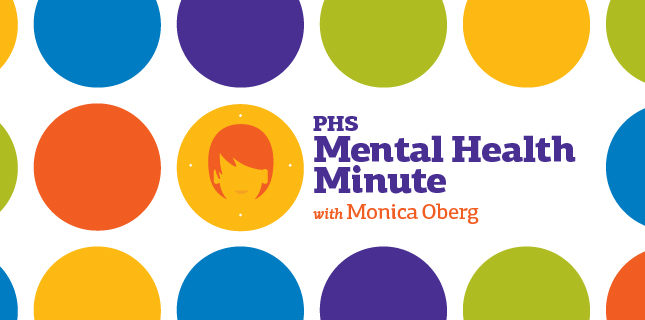Mental Health Minute: Signs It May Be Time to Seek Professional Help for a Child

It is crucial for parents and caregivers of children with medical complexities to take the time to care for their mental health. With our new series Mental Health Minute, PHS clinical social worker Monica Oberg will answer questions from parents and caregivers about navigating the stresses and concerns that come with this journey, from grief and balance to the isolation many parents experience.
May is Mental Health Awareness Month, and for this installment of Mental Health Minute we are answering a question about deciding to seek out professional help to manage the emotional health of your child.
Do you have a question that you would like Monica to answer? Leave it below!
“I worry about my child and wonder if they would benefit from counseling services, but don’t know how to determine if it would be a good fit. Are there certain signs I can look for that indicate my child should see a mental health professional?”
There are many, many signs and symptoms that may be concerning and lead you to consider seeking professional help for your child. I will stick to the areas I work closely with but as always, if you have a concern feel free to reach out to me, another mental health professional, or your child’s primary doctor. If you have a concern, pay attention. Often times it doesn’t go away; it may get worse. My philosophy is that if you have a concern, address it right away!
Separation anxiety
Separation anxiety is a developmental milestone for most kids. Most parents see it around 8 months of age up to about 14-18 months. Please take into consideration if your child is behind at all developmentally or cognitively as you may see this a little later. Separation anxiety may become a concern when it becomes excessive enough to interfere with normal everyday situations such as playing with friends or attending school. It also may be a concern if you are seeing it for weeks or months, versus a few hours or days.
Life changes
Has your family recently gone through a big change? Experienced the death of a loved one, a change in medical status, or a big move? If your child is having a strong emotional response months later, avoids talking at length about the change, or is experiencing guilt they may have unresolved grief or loss that needs to be addressed. This is one area that parents often feel their child is “too young to understand” or will grow out of it. There are ways to help your child and it’s best to address it before it turns into a bigger concern.
If your child is having an excessive amount of worry or fear and they are constantly on edge that occur more days than not for more than a few weeks it may be a sign to talk to a professional about your child’s worries and fears.
Changes in patterns
If you are noticing a change in your child’s eating patterns, such as eating much more or more often than they used to or have lost their appetite, that may be a concern – specifically when it’s not a child going through hormonal changes.
This is true for sleep as well. If your child is now sleeping all the time or is now struggling with sleep when this hasn’t been a problem and they aren’t going through a major developmental change then this might be something to talk with a mental health practitioner about. We all know those teenagers that now sleep until 11am and can’t get enough to eat. That’s not typically a problem if that’s the only change you are noticing.
Significant causes for concern
A huge concern at any age is if your child talks at all about suicide, has suicidal or homicidal ideation, or has demonstrated self-harming behaviors. These could all be a big concern and receiving additional help or support would be really important.
I encourage you to keep in mind that mental health is just as important as physical health. Take care of yourself and your family.
Originally published: May 1, 2019

